

When discussing dangerous game hunting in Africa, elephants are definitely on many hunters’ bucket lists. Although this animal is often referred to as a gentle giant, when agitated it can become very aggressive, and with a land speed of nearly 25 miles per hour, it is a force with which to be reckoned.
One of the Big 5, the Dangerous 7, and a definite trophy when hunting in Africa, elephants are a popular choice for those enjoying big game hunting. Elephants live in herds and are very protective of all their members, especially their calves. If they feel that their calves or members of the herd are in danger, they may become very defensive and aggressive towards the perceived threats, and this includes humans. Should humans enter their territory, surprise them, or come too close to their calves, they can and will attack if they feel it is warranted.
The herd leader is called the matriarch. She is the oldest, largest, and most dominant female. The matriarch is the backbone of the elephant family unit, as she provides stability and guidance within the herd. Other females comprising the family unit are usually her daughters and their offspring.
Elephants are herbivores, and consume a large variety of plant material, including grasses, leaves, shrubs, fruits, vegetables, and roots, depending on the season and their habitat. When it’s particularly dry, elephants will eat more woody parts of trees and shrubs like twigs, branches, and bark.
Elephants are constantly eating and can consume up to 330 pounds of food per day! They require about 18 to 26 gallons of water daily but may consume up to 40 gallons if it is very dry, or they have been without water for a long time.
There are two main types of elephants found in Africa, namely the African Bush Elephant and the African Forest Elephant:
The African Bush elephant, also known as the African savannah elephant, is the world’s largest land animal, weighing over 13,200 pounds! They are native to areas of sub-Saharan Africa, including Uganda, Kenya, Tanzania, Botswana, Zimbabwe, Namibia, Zambia, South Africa, and Angola.
The African Forest elephant is native to the humid tropical forests in West Africa and the Congo Basin and is the smallest of the three living elephant species, reaching a shoulder height of approximately 7.8 feet.
How do an elephant’s ears assist to keep it cool?
An interesting fact is that the size of an elephant’s ears is proportionate to its geographic distribution. The closer to the equator the elephant resides, the larger the ears, allowing more heat to move from the body, and therefore it has larger ears. African elephants live closest to the equator and have the largest ears to assist them in keeping cool.
They also use their ears to funnel in sound waves from their surrounding location, which then contributes to their keen sense of hearing. It is this excellent hearing that assists them in knowing when there are predators or dangers (including hunting safaris!) in the surrounding areas.
Name:
Loxodonta
Female Weight:
270-300 pounds
Male Weight:
13,200 pounds
Male Shoulder Height:
10.5 feet
Range:
Savannahs, Grasslands, Forests, and Deserts in Sub-Saharan Africa
Mating Season:
December–March with a 22-Month Gestation Period
Life span:
60-70 years
The African elephant is one of the most aggressive members of Africa’s Big 5
African elephants are the largest land animals, with adult males weighing between 4,000-14,000 pounds. Females are smaller but still have a considerable mass, weighing 6,000-8,000 pounds. An elephant’s skin is grey and wrinkly in appearance, with African elephants being more wrinkled than their Asian counterparts. These wrinkles act as a cooling mechanism by increasing the skin's surface area. The additional skin and wrinkles trap moisture that then takes longer to evaporate in the heat. Even though its skin is very tough, it is sensitive, and elephants, like most hairless mammals, are subject to sunburn. An elephant's trunk is an extension of the upper lip and nose and functions for breathing, feeding, smelling, drinking, lifting, grasping, feeding, dusting, communication, sensing, and as a defence or protection. The trunk contains about 100,000 muscles and tendons that give it great strength and amazing flexibility, with their trunks capable of expanding, contracting, and moving in various directions.
While Asian elephants have one finger-like projection at the tip of the trunk, African elephants have two. These finger-like projections contain delicate nerve endings and are capable of fine motor skills, for example grasping something small. Both African and Asian elephants have a total of 26 teeth, including two upper incisors (the tusks), 12 premolars (non-permanent teeth similar to baby teeth), and 12 molars. Asian elephants have smaller tusks than African elephants, and females have smaller tusks than males.
If you are undertaking elephant hunting in South Africa, there is a very good chance that it will be in the Limpopo, Mpumalanga, or KwaZulu-Natal provinces. The starting point for most elephant hunting in Africa is usually a watering point and sometimes a road or track. Elephant hunting in Africa is usually done on foot using trackers, by following promising fresh tracks or spoor until the animal is sighted. Just as rhinos are targets for their horns, elephants are targets for illegal hunters or poach wanting their tusks. Poachers kill up to 20,000 elephants each year simply for their tusks, which are traded illegally in the international market and are fuelled by Asia’s demand for ivory.
Like with any of the big-5 dangerous game animals, when elephant hunting in Africa, a minimum legal requirement is a .375 with a 300-grain bullet. Calibers 450 grain and up are recommended, such as a .416 Rigby, .458, or .458 Lott. Double rifles such as 470NE, 500NE, and up are ideal for hunting these beasts. Only solid bullets should be used on an elephant hunt.
Elephant hunting in Africa remains one of the most challenging and sought-after experiences for passionate hunters. As the largest land animal on Earth, the African elephant demands both respect and expertise from those who pursue it. If you’re seeking a thrilling and authentic safari adventure, an elephant hunting safari offers a unique opportunity to test your skills against this majestic and powerful creature.
Whether you’re in the vast savannahs of Namibia, the lush forests of Zimbabwe, or the remote wilderness of South Africa, elephant hunting allows you to connect with Africa’s rich wildlife heritage while playing a vital role in conservation efforts. Sustainable hunting contributes to the management of elephant populations, ensuring their survival and the protection of their natural habitats.
Elephant hunting is not for the faint-hearted. It requires patience, precision, and a deep understanding of the animal’s behaviour. Unlike other game species, elephants are intelligent and highly protective of their herd, making the hunt even more challenging. When agitated or threatened, these gentle giants can become aggressive, and their impressive speed of nearly 25 miles per hour adds to the excitement of the hunt.
Hunters targeting elephants often do so as part of a Big Game Safari, where they can pursue members of Africa’s Big 5 and Dangerous 7. The thrill of tracking an elephant, watching for signs of their presence, and carefully planning each step is a profound experience. It’s a test of your ability, nerve, and respect for the wild.
There are two main species of elephants in Africa: the African Bush Elephant and the African Forest Elephant. Each lives in different regions, offering diverse hunting environments. The African Bush Elephant is found in sub-Saharan countries like Botswana, Zimbabwe, South Africa, and Namibia, where hunters can pursue them across wide open plains, rugged terrains, and thick bushlands.
Hunting safaris in Africa typically take place on private game reserves or hunting concessions, ensuring that the animals are ethically managed and the land is preserved for future generations. Game Hunting Safaris offers tailored elephant hunting packages in some of the best hunting locations in Africa, providing exclusive access to premium hunting areas.
Elephant populations, particularly in southern Africa, are often managed through regulated hunting. Contrary to misconceptions, ethical hunting plays a vital role in conservation efforts. Through regulated hunting, the money generated from hunting licences contributes to anti-poaching initiatives, habitat preservation, and community development.
By controlling elephant numbers, sustainable hunting helps to maintain a balance between wildlife and human populations. Ethical hunters who follow regulations help protect elephant populations by discouraging illegal poaching and ensuring that only older, non-breeding bulls are targeted.
An elephant hunting safari is about more than just the hunt. It’s an immersive experience in some of Africa’s most stunning landscapes, where you can encounter a variety of wildlife, interact with local cultures, and enjoy the beauty of the African wilderness. Whether staying in a luxury lodge or a tented camp, your safari experience will be tailored to meet your preferences.
Expect long days of tracking, adrenaline-filled moments when you spot your quarry, and a deep sense of fulfilment when you succeed. At Game Hunting Safaris, our expert guides will ensure your hunt is ethical, successful, and unforgettable.
Ready to embark on the hunt of a lifetime? Whether you’re an experienced hunter or planning your first African safari, Game Hunting Safaris offers premium elephant hunting packages designed to provide the ultimate adventure. From expertly guided hunts to luxurious accommodations, we’ll ensure that every aspect of your trip is meticulously planned.
Contact us today to begin planning your African elephant hunting safari and make your dreams a reality.
The dry season, typically from May to October, is the best time for elephant hunting as visibility improves and animals congregate around waterholes.
A minimum of .375 calibre with 300-grain bullets is legally required, but many hunters prefer higher calibres like the .416 Rigby or .458 Lott for added stopping power.
Popular hunting destinations include Namibia, Zimbabwe, Botswana, and South Africa. Each offers unique landscapes and elephant populations.
Yes, elephant hunting is legal in many African countries with strict regulations. Ethical hunting is regulated by government authorities to ensure sustainable practices.
Regulated elephant hunting contributes to conservation by generating funds for anti-poaching efforts and local community development, helping to protect elephant populations.
Working with reputable hunting outfitters like Game Hunting Safaris guarantees that hunts follow all regulations and target older, non-breeding bulls.
High-quality gear, appropriate rifles, and personal essentials like clothing for varying climates are necessary. Your outfitter will provide detailed packing lists.
Yes, many hunters choose to combine elephant hunting with other species like buffalo, leopard, or plains game for a more diverse hunting experience.
Accommodations range from luxury lodges to comfortable tented camps, depending on your preferences and the location of your hunt.
Elephant hunting safaris usually last between 10 to 14 days, depending on the hunt’s location and your specific goals.
Search from our range of Hunts across various popular destinations in Africa.
Find A Hunt